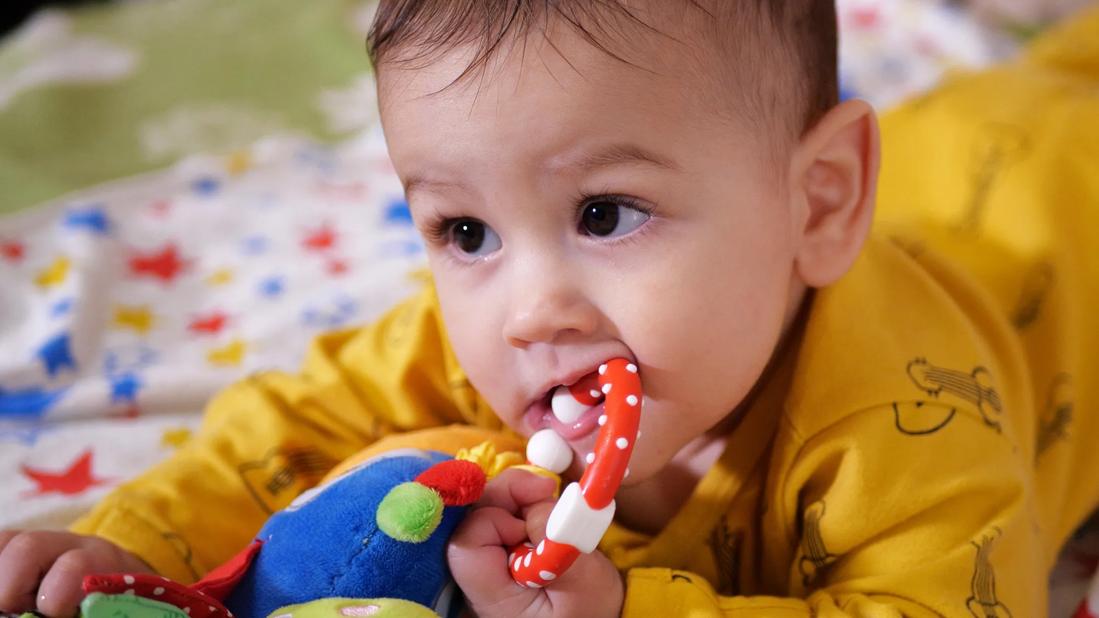Most teething symptoms are mild — fevers and other major symptoms are likely something else

Image content: This image is available to view online.
View image online (https://assets.clevelandclinic.org/transform/2e8d1ebf-b49f-4634-91f3-006bd8bbd030/baby-teething-toy-2149927960)
Baby on their belly, holding teething ring up to their mouth
Teething is a big milestone — and one that gets a bad rap. Teething is often unfairly blamed for almost everything, from fevers to diaper rashes.
Advertisement
Cleveland Clinic is a non-profit academic medical center. Advertising on our site helps support our mission. We do not endorse non-Cleveland Clinic products or services. Policy
What side effects does teething actually cause? And what’s overstated?
We asked pediatrician Lisa Diard, MD, to separate teething fact from fiction, so you know what to really expect.
The American Academy of Pediatrics says kids who are teething “are little different from kids who are not teething.” In other words, unlike illness, teething shouldn’t cause major changes to your baby’s mood, sleep or daily routine.
“Teething can cause mild gum discomfort for babies, but it shouldn’t be anything that severely derails their regular mood or schedule,” Dr. Diard agrees.
The signs of teething are there. But like that tooth that’s about to erupt, they may simmer under the surface. Dr. Diard shares what to look for.
Pack extra bibs. Teething babies are drool factories (even more so than usual, if you can believe it). That’s because saliva production increases before a tooth breaks through.
Teething babies can be even more likely than normal to put things in their mouths — fingers, toes, toys. Anything in reach is fair game. That’s because teething causes pressure in their gums, and biting helps relieve the discomfort.
You can help them find relief by allowing them to chew on a cold washcloth or a teething toy. Pay close attention so they don’t go gnawing on anything that can pose a choking risk.
Advertisement
A little irritability is normal when your baby is teething. Your baby may be clingier or seem “off.”
Mild fussiness tends to peak in the days right before a tooth breaks through and usually improves within three to four days.
Teething gets blamed for a lot, but it helps to remember this: Correlation doesn’t equal causation.
What does that mean? It means that babies get sick sometimes. They can get diaper rashes. They may have trouble sleeping. And those things can happen around the time when their teeth are coming in. But that doesn’t mean teething is causing those troubles.
With that in mind, let’s look at some common myths.
Teething doesn’t cause fevers, but it may raise your baby’s temperature slightly.
Here’s the difference:
Teething won’t cause a temperature that hits the threshold of a fever. But it could inch your child’s body temperature a bit higher than usual.
“If your baby has a fever of 100.4 F or higher, don’t ignore it and chalk it up to teething,” Dr. Diard advises. “A fever is a sign of an infection, not teething.”
Call your provider if your child:
Seek emergency care if your baby’s temperature is above 104 F (40 C).
Some people will tell you that when your baby swallows that extra saliva during teething, it mixes up in their bellies and creates loose stool. And — as you probably know all too well — runny poop can be a diaper rash waiting to happen.
But the theory hasn’t proven out in research. So, if your baby has a diaper rash, you’ll want to consider a cause other than teething, like:
Prevent diaper rash by changing diapers quickly when they’re wet or soiled. If a rash develops, clean their behind with mild soap and water and apply an ointment that contains zinc oxide.
Sleep issues can happen for all kinds of reasons, but teething isn’t usually one of them.
“Some people worry teething is causing their baby too much pain for them to sleep well,” Dr. Diard acknowledges. “But the discomfort of teething is pretty mild. It shouldn’t affect sleep.”
Advertisement
Help your baby get better rest by keeping a consistent bedtime routine and following safe sleep practices.
Teething shouldn’t be a big to-do. A little drool, chewing and fussiness are normal, but anything more than that deserves extra attention.
If your baby seems unusually sick or uncomfortable, reach out to your child’s healthcare provider. They can help you find the real cause — and help your little one feel better sooner.
Advertisement

Sign up for our Health Essentials emails for expert guidance on nutrition, fitness, sleep, skin care and more.
Learn more about our editorial process.
Advertisement
Most babies will crawl between 7 and 10 months old, but later can be normal, too
Adding extra formula, cereal or medications to your baby’s bottle is a dangerous and misguided practice
Teaching your baby to sign may help ease frustrations before they can talk, but it’s not a must-do
Babies can get congested easily, but you can calm their cough by keeping them hydrated, using nasal drops and running a humidifier
Try to burp your baby mid-feed and after they finish eating — but don’t sweat it if they don’t burp
Most babies will recognize their name by about 9 months old
Clean your baby’s mouth with a washcloth or small toothbrush if they have a tooth or you suspect thrush
‘Social smiles’ typically start around 8 weeks old, while laughter comes later — around 4 to 6 months
Although it could be used as a moisturizer, this new trend is not recommended
Communicating clear limits helps protect your time, energy and emotional well-being
High cholesterol can be genetic, but testing and treatment can lower your heart disease risk